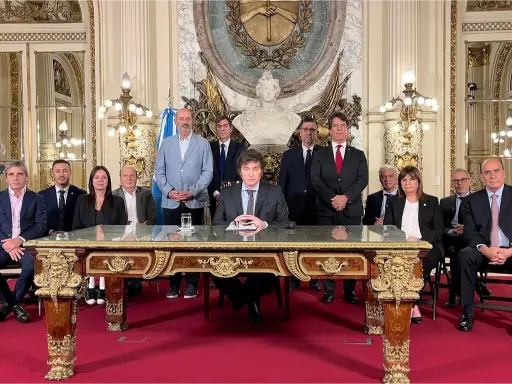Javier Milei, Argentina’s current president, has implemented a series of radical economic reforms since taking office in December 2023. His approach, often referred to as “shock therapy,” aims to stabilize Argentina’s long-struggling economy through significant fiscal and monetary changes.
One of Milei’s most notable actions has been his aggressive reduction in government spending. He has cut state subsidies, halved the number of ministries, and eliminated approximately 70,000 public sector jobs. These austerity measures have helped Argentina achieve its first budget surplus in over a decade, which is a significant milestone for the country.
Milei’s reforms also include efforts to tackle Argentina’s rampant inflation. He has managed to reduce the inflation rate from about 25% in December 2023 to around 13.2% by February 2024. These measures have involved stabilizing the central bank’s balance sheet, reducing peso-denominated liabilities, and increasing foreign assets.
However, his policies have been controversial and met with significant opposition. His austerity measures have led to rising poverty, with reports indicating an increase from 45% to 57% in general poverty, and a rise in child poverty from 62% to 70%. This has sparked widespread protests and strikes, particularly from labor unions and other social groups who are adversely affected by the cuts.
Milei’s economic reforms, including potential dollarization of the Argentine economy, are designed to stabilize the currency and curb inflation. These measures align with free-market principles and reflect a move towards economic models favored by the US and other Western nations. His administration is also focused on reducing state intervention and promoting private sector growth.
He has proposed the dollarization of Argentina’s economy, aiming to replace the peso with the US dollar to curb inflation and reduce the state’s power over monetary policy. This proposal has been divisive, with some viewing it as a necessary step to stabilize the economy, while others criticize it as a move that could undermine Argentina’s economic sovereignty.
Milei has significantly shifted the country’s foreign policy focus from China towards the United States. This realignment is characterized by several key actions and ideological commitments.
His government has taken steps to distance Argentina from China, including canceling Argentina’s planned accession to the BRICS group. His administration aims to reduce the influence of Chinese investments, particularly in strategic sectors like energy and lithium. Milei has expressed concerns over the sovereignty implications of Chinese-funded projects, such as the military-run space station and infrastructure ventures in Argentina.
He has also made it clear that he sees the United States as a crucial ally. His first foreign visit was to Washington, signaling a strategic pivot. This move aligns with his broader goal of integrating Argentina more closely with Western economic and political systems. Milei’s administration seeks to collaborate with the US on economic reforms, leveraging the US’s influence in institutions like the International Monetary Fund (IMF) to stabilize Argentina’s economy.
Milei has openly supported Ukraine in its conflict with Russia and has expressed solidarity with Israel, highlighting his commitment to aligning Argentina with Western geopolitical interests. This support contrasts with the previous administration’s stance, which often sided with non-Western powers.
Overall, Argentina’s new government led by Milei is marked by a clear shift towards Western alliances and away from China’s growing influence in Latin America. This realignment aims to foster economic stability and integrate Argentina more fully into the global market led by Western economies.
Despite the challenges he faces, Milei maintains a level of popular support, with many Argentines believing that his drastic measures are necessary to bring long-term stability and growth to the country. His administration continues to navigate the complex political landscape, attempting to push through reforms amidst significant resistance.
